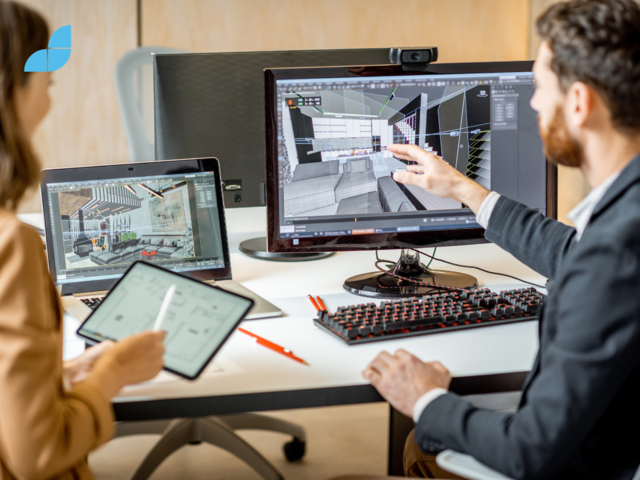Interior design is a fast-paced and rewarding career that involves a unique combination of both creative and analytical skills. An interior design scheme is more than creating a nice looking space, it involves problem solving and innovation in order to achieve a design that is both functional and aesthetically pleasing. Interior designers must find a balance between expressing their artistic vision and meeting the needs of the client. There is also an element of adaptability and flexibility required as interior design involves a diversity of potential clients and projects. So, deciding whether or not interior design is the right career choice for you requires some self-evaluation and reflection. In this blog post, we will look at the key qualities and skills required to succeed as an interior designer so you can assess your interest and suitability for this exciting industry.

Passion for Design and Aesthetics
Interior designers are enthusiastic about aesthetics and design. Design is such a broad and malleable term that in order to appreciate the variety of design styles, a designer must be willing to adapt their approach to meet the needs of their clients.
Design trends can flip from traditional to contemporary or to any number of areas therefore a designer must be kept up to speed on popular and available styles. In order to stay abreast they can immerse themselves in the world of interior design through magazines, blogs, and social media. If you are still asking if interior design is for you, the question is, “do you love to lose yourself in this sort of browsing?”
Interior design involves creative problem solving as well as spatial planning. When designing a space, a designer must consider both form and function. It is not enough for the space to look good, it must also meet the needs of the user. It is imperative for all the various elements to interact and create both a cohesive and visually appealing space. Designers either have an innate ability to envision the final layout of a space, or they have a strong desire to learn.
To determine if you have a passion for design, consider whether you find inspiration from visiting showrooms, reading design magazines, or browsing online resources. If you extract pleasure from rearranging furniture or decorating a room, then perhaps it is time to consider a career in interior design.
Strong interpersonal and communication abilities
A major part of the business of interior design involves frequent collaboration with clients, vendors, and other professionals. It is for these reasons that interior designers must have excellent interpersonal and communication skills so they can build a rapport with clients and can clearly understand their needs. Strong communication skills will also aid the presentation of ideas, negotiation with suppliers, and management of expectations throughout the design process.
When thinking about your approach to dealing with a client, consider your ability to empathize with others, to actively listen, and to effectively communicate your thoughts. Ask yourself how you performed in group projects, presentations, and collaborations. If you enjoy working with people and are confident in your communication skills, then you are already one step closer to a career in interior design.

Attention to Detail and Organization
Have you noticed that you have a talent for spotting small details that can make a big difference in a room? Every element of a design contributes to the overall aesthetic and functionality of a space which means that interior designers require a keen eye for detail. They must be meticulous in their work, from selecting the perfect colour palette to selecting the right furniture and accessories.
Interior designers frequently juggle multiple projects and deadlines at the same time, so time management and multitasking skills are essential. Much like finding a balance between aesthetics and functionality, interior design is about balancing the creative aspect of designing with the practicalities of the business. Consider your ability to manage tasks, meet deadlines, and stay organized to see if your detail-oriented personality and organizational skills are a good fit for a career in interior design.
Eagerness to Learn and Adapt
Continuous professional development is essential for designers because it allows them to stay current with industry trends and maintain a competitive edge. Because the industry is constantly evolving, professional interior designers must be eager to learn and adapt to new materials, techniques, and technologies.
Client needs and preferences change over time so flexibility and adaptability are also essential. To succeed in the fast-paced world of interior design, it is important to be willing to adapt your ideas and adjust your approach in response to these changes.
Take a moment and think critically about your ability to learn and adapt to new situations. Are you inspired by workshops, seminars, and conferences? Are you willing to try out new methods and to embrace new ideas? If so, your eagerness to learn and adapt could be a sign that interior design is the right fit for you.

Entrepreneurial spirit and business acumen are required.
Starting out as an interior designer often requires some freelance work or junior roles with established design studios. A strong entrepreneurial spirit as well as a solid understanding of the business side of the industry can be the key to success in this very competitive environment. Marketing, networking, and client acquisition are all necessary for success, as well as project management, financial management and budgeting.
When determining whether you have the entrepreneurial skills required for a career in interior design ask yourself if you are willing to promote yourself and your services while building relationships with clients and vendors, all the while managing your finances. When you take into account previous experiences with budgeting, goal setting, and taking calculated risks, did you succeed or is there more to learn?
Education and Certification
While talent and passion are important, formal education and professional certification is that vital component that can give you a competitive edge. Many aspiring designers pursue degrees in interior design, which furnishes them with the knowledge and skills needed to reveal their true ambition as a designer.
Accreditation and professional certification will not only teach what you need to know but it demonstrates a dedication to the field and validates your expertise. Internships and on-the-job training are also invaluable for developing a portfolio and gaining practical skills.
Are you looking forward to learning and growing in this field? Then take into account your willingness to pursue an interior design education and professional certification. Consider your educational opportunities and internships to see if pursuing an education in interior design aligns with your goals and interests.
A successful career in interior design is a unique combination of creative design, passion, strong interpersonal and communication skills, a detail-oriented and organized methodology, an eagerness to learn and adapt, an entrepreneurial spirit, and a solid educational foundation.
We encourage you to learn more about this exciting field. The British Academy of Interior Design is here to help you succeed as an interior designer by providing guidance, resources, and opportunities.



Comments
A fantastic blog post. We sincerely appreciate your blog post.